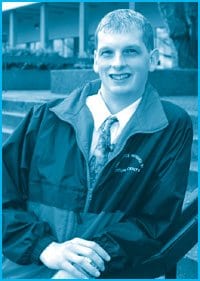Shawn Peters may be a relative “newy” to the gay scene but he has done more to queer Prince George in the last two years than most people do in a lifetime.
The 23-year-old didn’t grow up planning to be a gay activist; he fell into the role when Prince George’s first gay youth activist moved away a few years ago.
There weren’t many resources for queer youth back then, Peters recalls. So he took it upon himself to change that.
And change it he did.
In August 2001, Peters and his friends founded the Prince George chapter of Youthquest, part of British Columbia’s network of support services and drop-in centres for queer and questioning youth.
But they didn’t have any funding. So Peters dipped into his own pocket for the $30 they needed to host Prince George’s first queer youth dance. The event was a success. It also helped raise some money to start a drop-in program and print some posters.
The group has been growing ever since. (So has Peters. “I’m just a newy at this game of being out,” he reminds me. “I’m only three years old in gay terms.”)
Last year, Youthquest Prince George not only opened three more drop-in sites, but challenged its school board and its city government to confront the homophobia within.
The school board challenge gained significant momentum last May, after Jamie Lazarre, a Youthquest member, hung himself. His note said he couldn’t take the harassment anymore. He was 18 years old.
Lazarre’s suicide galvanized Prince George’s queer youth. In his honour, they re-doubled their efforts to make schools safer for themselves and for queer youth throughout the area.
Now, it seems their efforts may be starting to pay off.
A few months ago, the Prince George school district launched a study to gauge the level of bullying and harassment-and homophobia-in its schools. Peters has been working closely with the researchers and says their final report is almost ready. In fact, he plans to return to Prince George immediately after the Community Achievement Awards to put the finishing touches on the report and submit it to the district.
Though he can’t reveal exactly what will be in the report, he’s optimistic that it will contain several concrete recommendations to make schools in the district gay-friendlier. Among those recommendations: provide anti-homophobia training for teachers and administrators; add information on queer issues to the stack of pamphlets in counsellors’ offices; hire a full-time staff person to address homophobia and other forms of discrimination in the district; encourage the formation of gay-straight alliances in schools; and make sex education classes less heterosexist.
Peters says he wouldn’t have agreed to participate in the study if the school board hadn’t promised to act on the results. “And they know that I’m vocal enough that they have to continue doing stuff because I will stay on them until they do,” he says with a smile.
Convincing the Prince George and neighbouring school districts to acknowledge homophobia-let alone address it-can be an “uphill battle,” Peters concedes, but it’s well worth it.
The school board isn’t the only government body Peters and the youth of Prince George took on last year.
Last year was also the year they asked their city council to proclaim Pride Day and refused to take no for an answer-even after the adult queer organization in the area settled for a “watered-down” proclamation.
Council initially refused to proclaim anything, then came back with a broad Pride proclamation for all people regardless of race, gender or sexual orientation. But that wasn’t what the youth of Prince George had in mind.
They wanted a real Pride Proclamation, declaring a day of pride for gays, lesbians, bisexuals and transgendered people to be themselves and to be proud of it. So they filed a human rights complaint against the city of Prince George.
And they won-without even having to go to the tribunal.
It took a few months, but council eventually backed down and agreed to proclaim Pride-for the next three years. Council also agreed to fly the rainbow flag every Pride week from now until 2005, and to listen to a Youthquest presentation on the needs of queer youth in the region.
Peters is proud of what he and his fellow Youthquesters accomplished. “We’ve come a long way,” he says, “but we have a greater distance to go.”
And sometimes, he admits, the size of the task ahead and the responsibility of representing the youth can be daunting. “It’s extremely scary having all this responsibility put on,” he says. “And being this far north, you can’t just go to another city or community centre for support.”
But Prince George is making serious progress. It’s even catching up to Vancouver, he laughs.
“I want to pass Vancouver, leave them behind,” Peters says with a smile. “I want to bring the homos back to the north.”
Ironically, as Xtra West goes to press and as Peters goes back up north to help finalize the school report, the future of Youthquest Prince George may be in jeopardy. That’s because its funding is about to run out.
Since last August, Peters has been receiving a government grant, which has enabled him to work full-time on Youthquest projects. Now that grant is about to run out. So far, Peters hasn’t had any luck securing new funding, despite sending out numerous grant proposals. And he’s not sure what he’s going to do next.
“As much as I love [my work], I still need to put food on my own plate,” he says with a sigh.
YOUTHQUEST PRINCE GEORGE.
250.565.6333

 Why you can trust Xtra
Why you can trust Xtra


